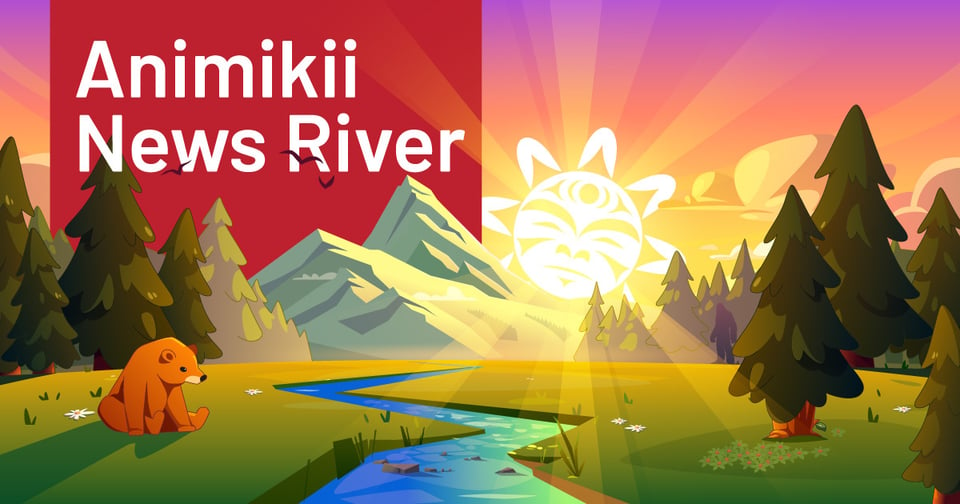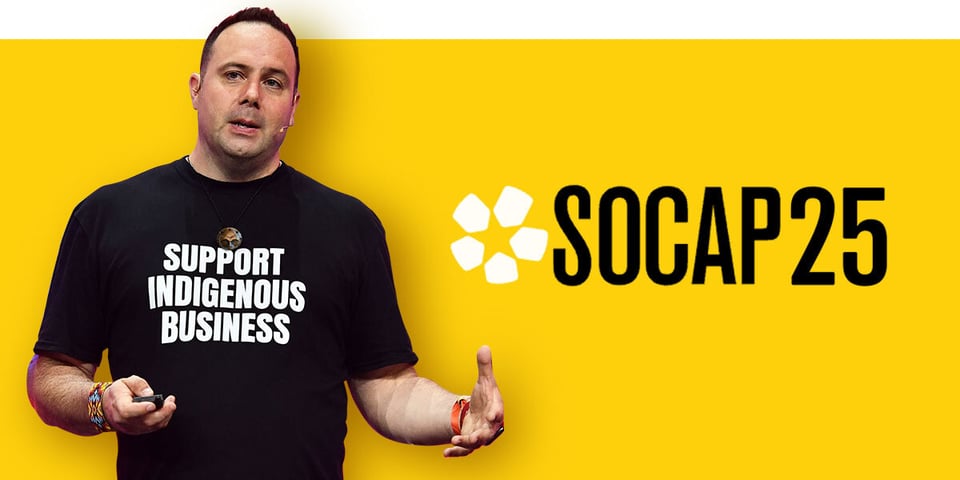Scholarships, Data Sovereignty, and SOCAP25
Final call for Indigenous youth awards applications, AI impacts on tribal nations, and our CEO heads to SOCAP25.

Boozhoo News River Readers,
Whoa, this day came fast - a final reminder that applications for our annual Technology and Entrepreneurship Awards for Indigenous youth close tonight!
We’ve already received double the amount of applications over last year's intake - indicating both increased visibility and need for such awards. If your organization has some extra funds to distribute before the winter break in December - we’ve got talented youth who could use it!
As always, thanks for being here, and on to the news…
This week’s stories include:
At the recent “Pre-Wiring the Rez” symposium, attendees learned how artificial intelligence is affecting tribal nations.
Inaugural Indigenous Datathon: Applying Indigenous Data Governance to Healthcare – will focus on health data and ethical and practical approaches to real-world questions.
Tribal leaders need better tools to address persistent data gaps that undermine their governance and economic development efforts

The Future Is Collaborative: Taking Impact Mainstream
The big picture: Our CEO Jeff Ward will be at SOCAP25, where he joins an incredible lineup of diverse hosts reimagining what leadership looks like.
Why it matters: As you all know, Jeff isn't your typical tech founder. He's building digital sovereignty for Indigenous communities through Animikii an Indigenous-led, tech-forward and community-driven company. 💻
If you see Jeff at SOCAP (Oct 27-29), ask him about:
Why Indigenous data sovereignty changes everything
How Animikii builds tech BY and FOR Indigenous communities
Our data platform called: Niiwin
Fair warning: This conversation might completely shift how you think about ownership, innovation and social impact. ⚡
Learn more: Still on the fence about SOCAP25? This is your sign to sign up - register here!
Curated Articles:
Tribes need data control to build economic power, strengthen governance, Brookings researcher says
Tribal leaders need better tools to address persistent data gaps that undermine their governance and economic development efforts, according to Rob Maxim, a fellow at the Brookings Institution who spoke Thursday at the Federal Reserve Bank of Minneapolis' Center for Indian Country Development. Maxim, a citizen of the Mashpee Wampanoag Tribe, outlined five critical data challenges facing Indian Country during a fireside chat with Casey Lozar, vice president and director of the Center for Indian Country Development. The discussion, held Thursday during the center's 10th anniversary event and data summit, focused on how poor data quality and limited access restrict tribal decision-making. Maxim pointed to New Zealand as a model for Indigenous data sovereignty. There, Maori data sovereignty is recognized as a treaty right. Stats New Zealand, the statistical arm of New Zealand’s government, operates a joint platform with Maori tribes that tracks tribally prioritized indicators like language proficiency. Each tribe appoints a data manager who controls what information becomes public. Tribes also access a private portal with detailed data about their lands and citizens for governance purposes. “This is the type of product I'd love to see pilot in the US, either on the federal or maybe even a state level,” Maxim said. Maxim urged tribal leaders to keep data on their agendas despite competing priorities, noting that good data remains critical to tribal sovereignty. He also called for more peer-to-peer learning among tribes.
Indigenous Data Network to hold first Indigenous Datathon
The Indigenous Data Network (IDN) will hold its first Indigenous Datathon on October 11 and 12, co-located with the biennial International Data Week 2025, one of the world’s leading data events for data science, research, and policy communities. The lead partner in the IDN is the University of Melbourne’s Indigenous Studies Unit, which is part of Onemda Aboriginal and Torres Strait Islander Health & Wellbeing in the Melbourne School of Population and Global Health at the University of Melbourne. The inaugural event, in Brisbane – Indigenous Datathon: Applying Indigenous Data Governance to Healthcare – will focus on health data and ethical and practical approaches to real-world questions. Participants will explore real-world questions using data science, guided by the CARE Principles (Collective Benefit, Authority to Control, Responsibility, Ethics) of Indigenous data governance. Working in teams and guided by mentors, participants will analyse datasets on healthcare while learning how to apply ethical, culturally responsive data practices. Expressions of Interest for participation were over-subscribed, with 42 participants selected to attend, along with nine mentors in various areas including epidemiology and Indigenous data governance. “Aboriginal and Torres Strait Islander peoples could take more control of their own lives, destinies and communities by developing their data ecosystems and Indigenous data governance. We know that self-determination works when sustainable and effective approaches are taken. Indigenous data governance should be a key platform in Indigenous futures.”
The fight for data sovereignty in the age of AI
AI is here and is already affecting tribal nations. That was a common theme among leaders from all over Indian Country who gathered at Arizona State University’s Sandra Day O’Connor College of Law on September 26 for the “Pre-Wiring the Rez” symposium to learn about how artificial intelligence is affecting tribal nations. “We have to embrace this (AI) but embrace this on our terms, that respects tribal sovereignty and digital sovereignty,” said Gila River Indian Community Gov. Stephen Roe Lewis. Leonard Bruce, Gila River, a data analyst with Gila River, said he was of two minds when it came to AI and data sovereignty. “On one hand, it can definitely bolster tribal sovereignty if we own and control the data about the information and stories that are told about us,” Bruce said. “On the other hand, it can also erode tribal sovereignty and tribal governance if those stories are being controlled by other folks and we don’t have any internal control over it.” Data sovereignty is the concept that data is controlled by and subject to the laws and governance structures of the nation, region or community where it is collected, processed or stored.
Details of mental wellness app for First Nations youth provided at Mississauga conference
Donna Keogh, who is a registered nurse, continues to provide valuable services to First Nations. Keogh previously worked at remote fly-in First Nations in Northern Ontario. These days, she is the director of nursing and Indigenous business development for TryCycle Data Systems. Keogh attended the Chiefs of Ontario Early Learning & Child Care Conference, which was held Oct. 2-3 in Mississauga, to provide details on Buddy’s Quest, one of TryCycle’s initiatives. Buddy’s Quest is the first gamified mental wellness app created for Indigenous youth. Keogh said youth themselves were instrumental in the creation of the app. “We listened to the youth,” Keogh said during her conference presentation. “They gave us great feedback. They gave us some altering feedback. And we designed it so they would be interested.” Buddy’s Quest is aimed at those aged seven to 14 and up.
Indigenous artists transform works at Metropolitan Museum in unsanctioned augmented reality project
On Indigenous Peoples’ Day (13 October), 17 Native artists staged an unsanctioned intervention inside the Metropolitan Museum of Art’s American Wing. Using augmented reality (AR), the artists intervened in the gallery’s 19th-century paintings—generic and imagined landscapes, portraits of affluent settlers and grandiose historical scenes—digitally superimposing cosmological figures, pow-wow dancers and suffocating layers of ivy. The unsanctioned digital intervention, ENCODED: Change the Story, Change the Future (until 31 December), was co-curated by the film-maker and curator Tracy Renée Rector and an anonymous Indigenous co-curator (who also sponsored the project), in collaboration with the non-profit media and design lab Amplifier. It launches as the American Wing celebrates its centenary, asking: what stories does American art tell? Who decides what’s worthy of display? And what happens when the museum will not make room, so artists take it?

Add a comment: